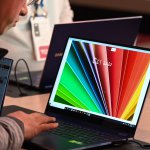Period tech could ease pain – and give work days back to sufferers

People who menstruate face significant additional hardships in the workplace compared to people who don’t. Most of that is down to the engrained patriarchal nature of society, but some of it is down to fundamental biology. In 2019, a survey of over 32,000 people who menstruate in the Netherlands revealed that on average, they lost 9 days of productivity per year due to period pain. Which is just one of the reasons why a new technology in development, which claims to reduce period pain to little or nothing, could be a game-changer in terms of helping to equalize the working experience across the world.
The power of heat and pulses.
The technology, called Artemis (named after the Greek goddess of nature, the hunt, and incongruously, childbirth) will be available first in the EU and the UK later in 2023, and, assuming it takes off there, is expected to be available to women in the US soon after.
Unlike some other devices, which are stuck to the body, the Artemis tech is worn more like a bodysuit, so it’s relatively comfortable under standard office clothes. The fundamentals of how it works though are a combination of two existing technology for the relief of period pain – a relatively gentle heat, and TENS technology (transcutaneous electrical nerve stimulation).
TENS pads have a checkered history in healthcare, having originally been marketed as a kind of no-effort exercise aid, but in recent years, they’ve proved invaluable during the experience of childbirth, as well as in other cases of pain flare-up, acting, it’s believed, to stop pain signals from reaching the brain, and so offering a drug-free alternative to sometimes harsh painkillers.
In terms of tackling period pain, those who suffer from it have found that oral painkillers give them only a few hours of pain relief, whereas the Artemis bodysuit is said to offer relief for as long as it’s worn.
Meanwhile, topical heat has often been found to be an effective soother of period pain, as it has a tendency to relax the muscles.
There’s an app for that.
When the suit is commercially available, it will be powered by a small battery pack-cum-TENS-machine, which can either fit in a pocket in the suit itself, or be easily clipped on. There are no complex wires involved – this is the 21st century, after all, if tech is not wireless by now, it’s hardly worth investing in – and, like many other tech devices in the healthcare sector, it can be controlled easily from a smartphone app, giving the wearer control over both the heat and electricity levels, so they can increase or decrease the intensity of either or both as their period pain demands.
While there are an increasing number of options either already on the market or heading there soon which tackle the debilitating effects of period pain, the Artemis is the first technology designed from the ground up not to look like a prosthetic appliance, but like an item of clothing. Its creator, Anna Zsofia Kormos, the co-founder of Alpha Femtech, which produces the Artemis, conducted a survey of 350 people who menstruate, to get a consensus on the important features that their ideal period pain technology would have, and that non-medical look and feel was extremely important.
There’s a logic there – the ideal when you’re in pain is a product that stops the pain without drawing attention to either the pain or its source, which is arguably why chemical painkillers have become more popular in the workplace than, for instance, a favorite remedy in private – the topical hot water bottle, which would be conspicuous in a work environment. The Artemis combines the muscle-relaxing effect of the hot water bottle with the pain signal-blocking effects of a TENS machine, but in a way that doesn’t particularly draw attention to either the initial pain or the reason for it.
Pain is not a weakness.
That’s important in a corporate environment not just because often in those environments, showing any signs of pain are ferociously interpreted as signs of weakness, and can be inflated to the sufferer’s career detriment, but also because people who’ve never experienced period pain can have a woeful tendency to laugh it off, and to attribute a particular, additional weakness to those whose lives can be poleaxed on a regular basis by biology in action.
This should not of course be allowed to go undisciplined, but without a fundamental restructuring of corporate culture in favor of those who menstruate, the practice of ridiculing or demeaning physical functions is likely to remain intact in corporate culture – which is potentially why the importance of any period pain tech being discreet and easy to wear proved so important in the Alpha Femtech research.
Productivity costs.
The Artemis is not expected to be especially cheap – it’s being priced around the $240 mark – but again, anyone who’s suffered from significant period pain is likely to regard that as money well spent. We’re probably a long way from companies offering Artemis (or any of the other available options to fight period pain, like the Myoovi, which works on a similar principle, but is stuck to the skin) as a part of their health and wellbeing packages to new joining staff as an option, too.
But available evidence and the testimony of those who’ve tried it suggest it may well make work life significantly more comfortable for people who menstruate – and companies might want to do the math of how much 9 days per year of lost productivity costs them per worker.
It’s also true that there has yet to be significant research done on TENS machines and whether they’re suitable as a long-term pain solution, with some medical authorities speculating that if used over a considerable length of time (rather, say, than for the intense process of childbirth), users might become accustomed to them, leading to a lowering of their pain-reduction effectivness. But this remains largely speculation too until that definitive research is done – which it may well be once technology like the Artemis is widely launched.
Flash in the pan or long-term pain relief and productivity booster? We’ll likely get a good idea before the end of 2023. But as the world of medtech moves towards putting ever more pain management directly in the hands of the sufferer, it could well be that the age of largely ungovernable period pain could be significantly on the wane.









